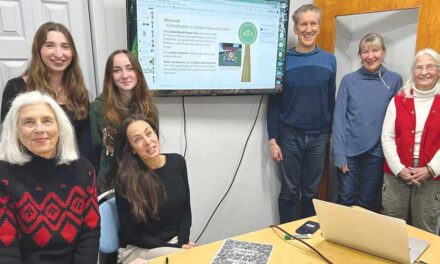Published in the October 14, 2016 edition
By GAIL LOWE
MELROSE — What would you do if you noticed that a loved one was becoming more and more forgetful? Would you go into denial? Confront the loved one head on, insisting that he or she see a doctor right away?
A Gould Street resident in Melrose took a different approach. He used his educational and professional background to write a book about the connection between aluminum and Alzheimer’s disease, autism and stroke.
The book, titled “Prevent Alzheimer’s, Autism and Stroke,” was published on Sept. 1, 2016 and is available at www.amazon.com.
The author, Dennis N. Crouse, wrote from his own experience when his mother began having trouble balancing her checkbook.
According to the National Institute on Aging, Alzheimer’s disease changes certain areas of the brain and results in the death of many nerve cells. Symptoms of Alzheimer’s begin slowly and worsen steadily as damage to nerve cells spreads throughout the brain. As time goes by, forgetfulness gives way to serious problems with thinking, judgment, recognizing family and friends and the ability to perform daily activities like driving a car or handling money. Eventually, the person needs total care.
In the case of Crouse’s mother, symptoms began to appear when she was in her 80s.
“She had always been very sharp mentally but then she began having panic attacks while attempting to balance her checkbook,” he explained. “She also became more socially withdrawn and refused to have her hearing aids repaired.”
Crouse’s siblings also noticed their mother’s short-term memory deficit but several nephews who had less contact with her refused to believe there was a problem. Family members wondered what should be done about it.
Beulah Crouse, a resident of Marion, Iowa, had always prided herself on her mental acuity, including the ability to manage her finances. Beulah also searched the Internet and gathered information she assembled into a book on the family’s genealogy and history.
“She put the book together from a sea of papers carefully laid out on a table in the basement,” said Crouse.
But when he learned about the trouble she was having with her checkbook and hearing aids, he grew concerned enough to research topics on the Internet that related to memory loss. What he learned concerned him even more.
“I found that my mother had what is known as mild cognitive impairment (MCI) and this was later confirmed by her doctor following testing,” said Crouse, adding that MCI involves short-term memory loss and impacts daily living skills. In short, Crouse was looking at what is typical of third stage Alzheimer’s disease.
He discovered even more. An additional symptom of Beulah’s condition was “sundowning,” a psychological syndrome that occurs late afternoon into early evening and causes confusion and agitation in Alzheimer’s patients.
“She became unable to prepare the evening meal,” said Crouse. “My parents adapted when my father learned how to cook.”
Crouse encouraged his mother to go to a memory clinic but while she admitted to having a memory problem, she had a dislike for doctors and refused to make an appointment. “She was happy to accept her declining short-term memory as a sign of aging,” said Crouse.
The generally accepted belief that short-term memory loss and Alzheimer’s are inevitable consequences of aging is incorrect, said Crouse.
As an example, he said there are countries such as Malaysia and Singapore with virtually no Alzheimer’s disease and the same lifespan as for people in the U.S.
Crouse said he became worried that his mother’s dislike for doctors was resulting in a missed opportunity to prevent her short-term memory from declining further. This situation is common. According to Alzheimer’s Association, 50 percent of those with the disease go undiagnosed and untreated.
As Crouse continued his research, the idea that Alzheimer’s disease might be genetic crossed his mind. But when reviewing the books his mother prepared on the family history there was no evidence of dementia in the family. In addition, his preliminary research on Alzheimer’s revealed that more than 98 percent of the cases are known as “sporadic Alzheimer’s” because there is no family history of the disease.
“This implies that Alzheimer’s is primarily due to an environmental cause,” he said.
As a scientist with a bachelor of science in biochemistry and Ph.D. in chemistry from Harvard University, Crouse has spent his career detecting environmental toxins — including aluminum — that accumulate in the body.
“In order to research memory loss and Alzheimer’s, I used the power of the Internet to retrieve and read thousands of scientific research papers. I also took courses on dementia and neuroscience to learn what is currently known about memory loss. In the beginning, I didn’t plan to write a book. I merely wanted to help my mother.”
“During my research for the book, I read a paper that claimed aluminum also causes autism. As I continued to pursue this claim, I saw a strong connection between neurotoxic aluminum and Alzheimer’s, stroke and autism. The information was so important that my wife Laurie Adamson encouraged me to write a book.”
It took two years for him to write it, have it peer reviewed and finally get it published. Instead of going the route of a known publishing house, he decided to self-publish and set up Etiological Publishing.
The first part of Chapter 1 is like a Sherlock Holmes detective story that mirrors his own deductive reasoning into what causes Alzheimer’s based on current research.
Crouse said that neurotoxic aluminum is any form of aluminum that can be absorbed by the body at the pH of the upper gastro-intestinal tract, inhaled as a water soluble solution or injected as a vaccine adjuvant. Aluminum sources include antacids, cookware, coffee makers, soda cans, drinking water, baking powder, candy and gum, colorants in pharmaceuticals and drugs and underarm antiperspirant. It’s also found in baby formula.
“In my book, I provide tables of the amounts of neurotoxic aluminum in these sources,” said Crouse. “I suggest alternatives in all cases that are either aluminum free or have very little aluminum.”
The author also describes in detail a proven and simple way to rid the body of ingested aluminum by supplementing the daily intake of a common dissolved mineral.
Crouse said he has given free talks in Boston and is scheduled for a free talk in Boulder, Colo. later this fall. He also is working with the Melrose Public Library to give a possible talk. He would welcome other opportunities to spread the word, such as visits to senior centers, health organizations and parenting groups to talk about any aspect of his book.
Beulah Crouse has been willing to try all the recommendations her son describes with one exception — 40 minutes of aerobic exercise every other day.
“She believes she gets exercise every day going up and down the stairs in her home,” said Crouse.
In a few weeks, Beulah Crouse will turn 90. She now wears new hearing aids and is looking forward to her birthday party. Crouse’s blog includes an aluminum-free birthday cake recipe for his mother.
“She still has MCI, as confirmed by a recent visit to her doctor but her short-term memory is not getting worse and seems to be getting better,” said Crouse.
In light of Beulah’s stabilized short-term memory, her doctor requested a copy of her son’s book.
“Her doctor reported that she deals with a number of patients who suffer from a declining short-term memory,” said Crouse. “Since the book’s recommendations helped my mother, her doctor hopes others can benefit in the same way.”
According to the Alzheimer’s Association website, approximately five million Americans have been diagnosed with Alzheimer’s and the numbers are rising as the population ages. Further, many people younger than age 65 have been found to have some form of early onset dementia, including Alzheimer’s. It is estimated that one to four family members act as caregivers for each individual with Alzheimer’s.
In the Crouse family, it is Beulah’s husband Norman, a 93-year-old World War II veteran, who takes care of her.
To purchase a copy of “Prevent Alzheimer’s disease, Autism and Stroke” in soft cover edition, visit www.amazon.com. The book sells for $16.95. The Kindle version is $8.90.
To learn more about the aluminum connection, visit Crouse’s blog at https://prent-alzheimers-autism-stroke.blogspot.com.





